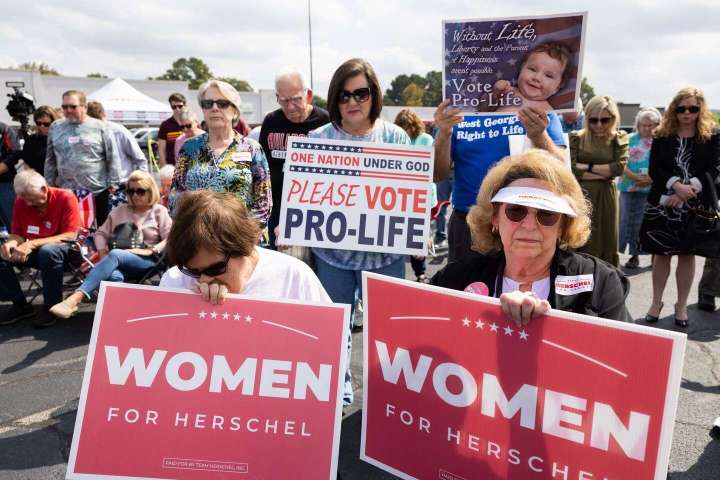When the Daily Beast reported that Georgia U.S. Senate candidate Herschel Walker had paid for a girlfriend’s abortion in 2009 — a claim Walker has both denied and denied remembering — it seemed like the sort of revelation that might upend the close race. After all, here was a story centered on one of the most polarizing issues of the 2022 midterms, abortion, with a fervently Republican antiabortion candidate apparently exposed as hypocritical.
The Herschel Walker abortion report doesn’t seem to have changed much

Walker’s son Christian quickly and loudly turned on his father. Other Republicans seemed worried, with some expressing concern that they were stuck with Walker as their party’s nominee.
Polling has come trickling in since the Oct. 4 report. But, so far, those concerns appear to have been unnecessary. Views of Walker are just about the same as they were before the news broke, as is the state of the race.
Consider polling conducted by Quinnipiac University that measured support for Walker and his opponent, Sen. Raphael G. Warnock (D), in mid-September and early October. Last month, Warnock was up by six points. This month, he was up by seven — a change without any statistical significance.
If we break out the vote by party, you can see how subtle the shifts were. A slight widening of the margin for Democrats and a slight narrowing for Republicans but, again, not ones that reflect any obviously significant shift. (The periods during which the polls were in the field — that is, respondents were being called — are indicated with a solid line. The dotted line is the period between polls.)
On Tuesday, the Atlanta Journal-Constitution released new polling conducted by the University of Georgia. It showed what seemed to be a flip in the state of the race since polling in September: Then, Walker was up by two points. Now, Warnock is up by three. Was this a sign that the abortion report had an effect?
Those, however, are not meaningful changes. Margins of error in polling mean that both polls showed something similar: a dead heat. More important, for our purposes, the last day during which the new poll was being conducted was the day on which the Daily Beast report came out. In other words, that news isn’t reflected in these numbers.
Many caveats should be applied here. One is that most voters probably wouldn’t have heard of the new story immediately — if they know about it at all. Another is that support measured in polling is only one point of consideration. There’s also enthusiasm among voters, which can determine whether people vote at all.
To that point, we can look at national polling from YouGov, conducted for the Economist. The pollsters were talking to voters immediately before the Daily Beast report and a few days after, giving us a good sense of how views might have changed. They asked whether respondents viewed Walker and Warnock favorably, determining that more people said they viewed Walker favorably.
But more people had heard of Walker than had heard of Warnock. If we look solely at the percentage of people who have opinions of either candidate, Walker’s favorability took a hit.
But, again, that is national polling and not a measure of support in the Senate race. This mostly (if not entirely) reflects Republicans outside of Georgia looking at Walker more skeptically than they had, a shift that wouldn’t necessarily manifest in the election itself.
The reports focus on a woman who said Walker paid for her to have an abortion in 2009 and that he ended a relationship with her in 2011 after she refused to have the procedure again. The woman, who is the mother of one of Walker’s children, has told The Washington Post that the reports in the Daily Beast and the New York Times accurately described her experiences. She spoke on the condition of anonymity to protect her privacy and that of her child.
Even before the Daily Beast report, Walker was suffering from relatively low Republican enthusiasm for his candidacy. Senate Minority Leader Mitch McConnell (R-Ky.) had suggested months ago that he was concerned whether his party had fielded candidates good enough to beat the Democrats — comments interpreted as referring to Walker and others. In other words, some skepticism of Walker was already baked in; the new report might simply have been thrown onto the pile.
The best thing Walker has had going for him from the outset is the R that will appear next to his name on the ballot. That alone means that a large part of the electorate will support him but also that a large part will support his opponent. So far, it doesn’t seem that the rest of the electorate has found much inspiration in the new allegation about his past to vote for or against him.






